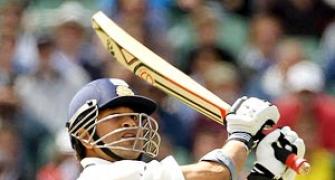After a disastrous 2011, stock market investors are pinning hopes on next year. Top sell-side analysts believe though there is more pain ahead, 2012 is likely to end on a positive note. The Bombay Stock Exchange (BSE) benchmark, the Sensex, could end 2012 between 17,000 and 19,285 levels, as the central bank starts easing its monetary policy and on possible resolution of the euro zone debt crisis, indicate estimates provided by leading domestic brokerages to Business Standard.
The Bombay Stock Exchange (BSE) benchmark, the Sensex, could end 2012 between 17,000 and 19,285 levels, as the central bank starts easing its monetary policy and on possible resolution of the euro zone debt crisis, indicate estimates provided by leading domestic brokerages to Business Standard.
However, before this happens, things could get worse. A 5-15 per cent downside for the 30-stock index is likely, due to the worsening macroeconomic scenario in India and concerns surrounding the euro zone debt crisis.
Most brokerages expect the Sensex to bottom out between 13,500 and 14,500 in the first half of 2012.
IIFL (India Infoline), Motilal Oswal, Kotak Securities, Religare Securities, Angel Broking, Emkay Global, Avendus Securities, Nirmal Bang and SMC Global responded to a detailed questionnaire sent by Business Standard.
These brokerages were asked to give their Sensex/Nifty target by December 2012, possible downside for key indices from the present levels, Sensex earnings estimate for 2011-12 and 2012-13 and key triggers to look for in 2012.
Domestic factors like high inflation, rising interest rates and governance issues, coupled with global concerns like the euro zone debt crisis and slowdown in the US, sapped investors' appetite for Indian stocks this year.
At on Monday's close of 15,970, the Sensex has lost 22 per cent this year so far, making India one of the worst performing markets in the world.
Market experts believe some of these concerns may continue to weigh on Indian shares in the near term.
"Multiple headwinds, such as fast decelerating corporate earnings growth, policy paralysis, private investment inertia, fiscal and current account deficits and rupee depreciation, will continue to weigh on the market in early 2012," said Amar Ambani, head of research at IIFL.
"However, reversal of inflation and the rate cycle could drive material recovery in the second half."
After raising its key policy rates 13 times since March 2010 to tame inflation, the Reserve Bank of India (RBI) kept these unchanged in its monetary policy review this month and signalled a reversal in its stance.
Most economists now expect the central bank to start cutting policy rates after March, as inflation starts moderating. The wholesale-price based inflation stood at 9.11 per cent in November. RBI expects this to ease to seven per cent by March 2012.
"We assume there will be no defaults or bankruptcies in Europe and the US may continue its slow growth. This may lead to some moderation in global commodity prices, including that in crude oil. Locally, interest rates are expected to come down in the next financial year. We think that tough reforms measures will be initiated by the government in the next calendar year," said Dipen Shah, head of fundamental research at Kotak Securities.
"All these factors provide the ideal setting for markets to move up next year." He expects the Sensex to deliver 20 per cent returns in the next calendar year.
The movement of the rupee against the dollar will also be crucial in determining the fortunes of Indian stock markets in 2012, experts say.
"Factors leading to the depreciation of the rupee are unlikely to subside in a hurry. Higher fiscal and trade deficits, government policies and the possibility of international shocks, especially from the euro zone, continue to remain the key concerns," said Anish Damania, business head (institutional equity), Emkay Global Financial Services.
The rupee, the worst performer among Asian peers, has depreciated 18 per cent against the dollar this year. This sharp fall has exacerbated losses for investors in Indian stock market, with the Sensex losing 34 per cent in dollar terms.
"Considering the slew of social schemes being launched by the UPA government, even foreign investors have realised that this is just the beginning and the situation will only get worse from here on, before getting better," said Jagannadham Thunuguntla, strategist and head of research, SMC Global Securities.
"They will be cautious before making any fresh allocations to India in their portfolios in the new calendar year. This may lead to a sideways or range-bound market for the next couple of months," he added.
After pumping in a record $29 billion (Rs 1,33,266 crore) in 2010, foreign institutional investors (FIIs) have withdrawn $371.90 million (Rs 2,784.30 crore) in this year so far, according to data available on the Securities and Exchange Board of India (Sebi) website.
"With further weakness expected in rupee, foreign investors would be cautious about investing in India, despite attractive valuation of many large-cap stocks. Once the dollar tops out and Indian trade/fiscal situation starts stabilising, the market may witness resumption in FII inflows," IIFL's Ambani said.
The key triggers to watch out for in 2012 for Indian shares would be reversal of inflation and interest rate cycle, expected fall in crude oil and commodity prices, policy actions from the government, fiscal/trade scenario in India, euro zone debt situation and economic scenario in the US and the China, according to brokerages.








